Moving to a new country is an exhilarating adventure filled with anticipation and excitement, accompanied by a mix of curiosity and anxiety.
When it comes to Finland, acclimating can be a wonderful experience filled with scenic nature, an intriguing language, and freedom from small talk where it serves no purpose.
However, even the most well-informed individuals are almost guaranteed to encounter surprises and unexpected discoveries when they begin their new life in Finland.
It is also likely you will sometimes find yourself overwhelmed by bureaucracy or wondering why people plug in their (non-electric) cars in the winter.
This article aims to share insights from those who have already made the move. I also asked on Instagram and included some of the hundreds of comments in this blog post!

Table of Contents
- 1. Everything happens on time in Finland
- 2. Free wi-fi
- 3. Libraries offer free services, books and other resources
- 4. Affordable sports facilities
- 5. The sun has an all-or-nothing attitude
- 6. You can trust the authorities
- 7. Finnish authorities can appear too serious
- 8. You are always close to nature
- 9. Cost of living in the cities can be high
- 10. There are specific requirements for professionals
- 11. Affordable childcare and healthcare
- 12. Free education
- 13. You need electronic identification provided by your bank at places you wouldn’t expect
- 14. After moving to Finland your credit record shows you lived abroad
- 15. Loyalty cards and points are everywhere
- 16. Filling forms and waiting
- 17. Everyone goes on holiday at the same time
- 18. Signs, road signs and traffic lights
- 19. Directions in street signs can change language
- 20. Silence and being quiet in public
- 21. Rules in apartment buildings
- 22. Living in a Finnish apartment
- 23. People maximize personal space
- 24. Everyone knows English but…
- 25. Things won’t stop for snow or low temperatures
- 26. Driving in Finland is different in the winter
- 27. A crucial part of Finnish summers: summer cottages
- 28. You will understand announcements and signs
- 29. Networks are important
- 30. You can live without a car
- 31. How efficient and organized everything is
1. Everything happens on time in Finland
When Finns agree to meet at 5 pm, they will be wondering where you are 2 minutes past and might text you to ask 5 minutes past. It is polite to send a message to let someone waiting for you know you are running late.
The most important thing to note is that you shouldn’t expect officials, lecturers, or doctors to wait for you to arrive 10 minutes late for an appointment or lecture. Doors can be closed, or your appointment given to someone else. Public transport will also run on time, or there will be announcements and notices will be on screens.
2. Free wi-fi
It sounds funny, but access to the internet is seen as such an important thing in Finland it was declared a legal right in 2010. You still have to pay to use the internet at home, but free wi-fi is available at most cafes, on long-distance trains, and across cities.
3. Libraries offer free services, books and other resources
One of the places you can also find plenty of other services, in addition to wi-fi, is the library. Even small cities and towns usually have a library that is free to use as long as you have a library card (you need to be a resident).
Many libraries have spaces for meetings, spaces to work, and even rooms to sing karaoke in. In addition to printed books, libraries provide audiobooks and music and are well-maintained spaces.
Commenters on Instagram also mentioned this:
“The last time I visited Oodi (library) was with a group of foreigners and I was surprised to see they were amazed by the services and felt so bad because I have “gotten used to” the high standards of the libraries in Finland. It was a good reminder to appreciate what Finland has to offer.”
“It surprised me how you can borrow tools and camping stuff from the library.”

4. Affordable sports facilities
The third resource that makes everyday life more affordable are public indoor swimming pools, gyms, and other sports facilities like ice rinks maintained by the cities.
These facilities are usually not free to access, but they offer more affordable prices when you visit more often. Many of them have a shared sauna to use too.
5. The sun has an all-or-nothing attitude
One of the first things you realized about Finland must have been that the winters are cold, and there is a lot of snow.
But it can be difficult to really understand that the sun has an all-or-nothing attitude: at the darkest time of the year in November and December, you see the sun for maybe five hours during the day, depending on how far north you live. It can be grey and cloudy during those hours, so it feels like the sun has disappeared.
It’s good to know this doesn’t last very long, and many Finns use vitamin D supplements and bright lights throughout the darkest months to keep their energy levels up. These months are also fantastic for sitting by a fireplace or candle, drinking hot glögi or coffee, wearing comfortable warm layers, and watching the snow fall slowly.
In the summer, the sun is up all night. Get good curtains or shades if you’re not used to sleeping when it’s light. Make sure you stay up some summer mornings to see the magical moments when the sun sets and rises almost immediately!
To the question what surprised you about living in Finland, one commenter replied: “The midnight sun! I was so taken by it that I couldn’t go to sleep. I often went for a bike ride around the town after midnight in the magical summer light.”

This might seem obvious if you are moving within Europe. But for those moving from further away, it is worth pointing out you can trust the officials, corruption is very low, and it is not possible to use connections or money to get things done faster or go around the system.
A no means no in this system and is based on rules the authorities have to follow, so trying to challenge it usually only leads to a lot of frustration.
Sometimes foreigners might notice Finnish officials are very serious and stern, even when you try to be especially polite and pleasant toward them. It can even seem scary, especially when you are arriving in the country or applying for permits.
Even when we Finns deal with the officials, it is expected in the Finnish culture. Another side of this is that Finns are, on average, very honest and reliable. If you drop money on the street, there is a good chance someone will run after you to hand it back. We take tasks, responsibilities, and others seriously.
A reader told about one experience she had: “My daughter once left an irreplaceable item on the tram. The tram cleaner called to tell us how to retrieve it.”
Other commenters mentioned things like “I love Finnish people because they take you as you are/they don’t judge you. They are always willing to help and have an extremely calming energy.”
And: “One of my biggest shocks and what I liked the most is the people, Finnish people are so transparent, they don’t judge you, free of criticism, you feel safe around them, and you can be who you are always…”
8. You are always close to nature
It sounds like a line from a travel brochure, but ask anyone who lives in Finland: nature is always nearby. Even if you live in Helsinki or the other big cities, there are a number of parks, access to lakes or the seaside, and places to walk, run, cycle, and spend time in the city.
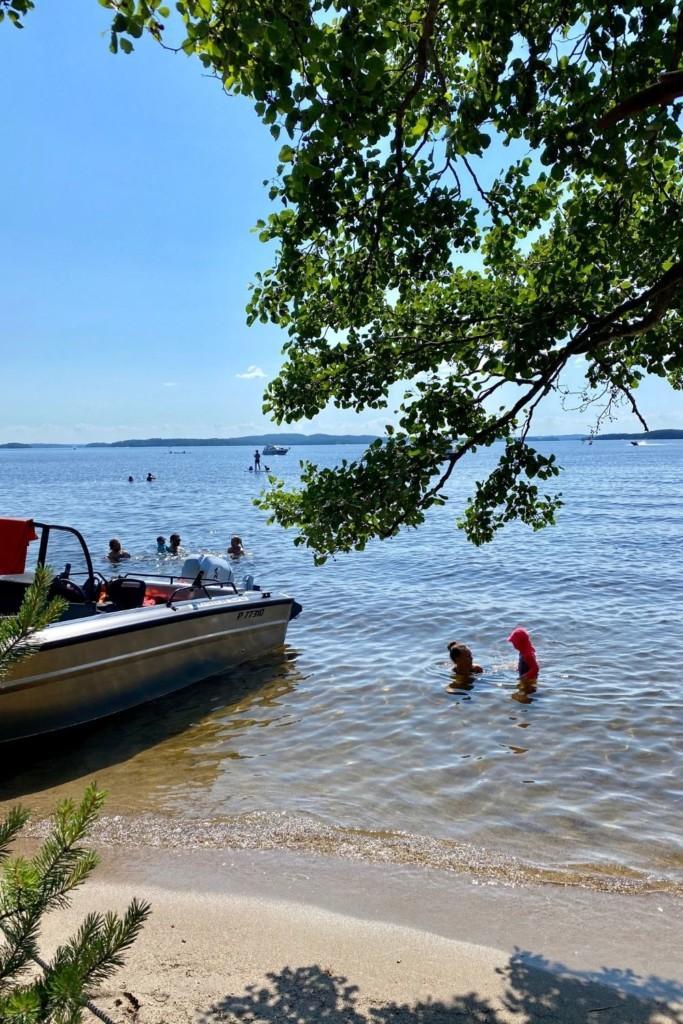
Helsinki and Turku have archipelago or islands to explore in the summer, while cities including Tampere, Oulu, and Kuopio are located right next to lakes. If you really want to get out of the city, a one-hour train ride (or less) will get you to the green countryside and fields, forests, and lakes as far as the eye can see.
You can also access some breathtaking views and experiences across the country, for example, in Lapland or lake Saimaa. But you are pretty much guaranteed to have access to beautiful scenery and outdoor activities even after a normal workday.
Some Instagram commenters brought this up too:
“There is at least one park or green space within 1km radius in almost every place.”
“There’s lots of forest inside the metropolis. You can commute, by bicycle, literally inside a forest trail from North Helsinki to the center without going outside the forest trails.”
9. Cost of living in the cities can be high
Although they don’t make the “Most expensive cities in the world” lists, living in the biggest cities in Finland can be relatively expensive, and salaries can be lower than in other European cities, depending on the field you work in. Some jobs offer higher wages in these locations to account for the costs, but this is not always the case.
When you plan your job search, it might make sense to compare living costs, costs of commuting a little further away, and salaries between cities. Would living in a smaller city with lower living costs and access to more activities and nature at your doorstep be the perfect option?
10. There are specific requirements for professionals
Sometimes the requirements to work in your field can surprise as you plan your move to Finland. You might need to validate your degrees or study more to work in your field. All these things are worth looking into before you arrive.
Start by looking at the information provided by the Finnish National Agency for Education for holders of foreign qualifications.

11. Affordable childcare and healthcare
Especially for those moving from the UK and US, childcare and healthcare costs can be very positive surprises. Charges are based on income and number of children for childcare and the country you are moving from, and whether the Finnish system covers you for healthcare.
Americans and anyone moving from similar insurance-based healthcare systems will find the costs of Finnish healthcare, even without insurance, much lower. It is still a good idea to find out how you are covered and if you can get insurance that also covers private healthcare.
Healthcare and childcare are not free in Finland, just much more affordable than in some other countries.
There are other perks too, like this comment highlights: “It surprised me that parents travelling with a baby trolley don’t pay for public transportation”.
12. Free education
Education in Finland is free, which can also be a major benefit for families. Higher education comes with tuition fees for international students from outside the EU who don’t study in Finnish or Swedish, but it is free for Finns and permanent residents.

13. You need electronic identification provided by your bank at places you wouldn’t expect
Banks in Finland provide a service that allows you to prove your identity electronically by logging into your bank’s system. Almost all official services in Finland use this.
Whether you are getting an insurance quote, a loyalty card for the grocery store chain, or submitting official documents or taxes, you might have to use this type of identification.
The good news is that as soon as you open a bank account and are in the Finnish system, you can usually use this ID verification method.
14. After moving to Finland your credit record shows you lived abroad
This may come as a surprise to Finns moving back after living abroad too, but you might get notices for your credit record showing anomalies for some time after moving to Finland. Having this note on your record will not stop you from getting insurance or using bank services, but it stops many things from going through automatic systems.
It is good to be aware that for a year after your move, some companies might not allow you to get credit, for example, if you wanted to buy a new phone with monthly payments. It depends on the individual companies.
If you are still determining if there might be another problem in your records, you can check your Finnish credit record once a year without charge. The note about moving from abroad does not appear in this report, but you can ask your customer service agent when any flags come up.

15. Loyalty cards and points are everywhere
We are surrounded by chains and loyalty cards everywhere, but Finland takes it to a different level. Many people in Finland will visit either S- or K-chain stores for groceries and own both loyalty cards.
Many restaurant chains are part of this system, too, and you can get bonus points for having the right insurance, data plan, hotel chain and cruise trips, dentist, and security system for your home, to mention a few.
Some will see this as a benefit, and some will feel it is too much. Whichever side you land on, using the loyalty cards to collect bonus points is just something you can do if you want to.
16. Filling forms and waiting
No one loves bureaucracy and you will face a few forms and a longer process than in some other countries to enter Finland and stay, especially if you arrive from outside the EU. On the positive side, Finnish forms and requirements tend to be clear. This is where peer support and talking to people who have experience of immigration can be invaluable to save your nerves.
Once the initial steps have been taken and your details are in the official systems, things go more smoothly. Still, even for Finns many official processes take weeks or a few months from filing paperwork. At least most forms can be submitted online.
Commenters brought it up too, but were able to put up with it: “To deal with bureaucracy as a foreigner – Finns love law and order AND PAPERWORK! But it’s easy after you’re a resident.”
“I would never have thought that opening a bank account would be more difficult than getting a job, especially as a newcomer in my profession.”

17. Everyone goes on holiday at the same time
Many Finns have more time off than you might be used to and several holidays across the year. The most notable one is the summer holidays when some offices close down entirely for a month or so in July.
There are also “skiing holidays”, hiihtoloma, in the spring. That is when schools break for slightly different weeks in different parts of Finland. If you are not tied to school schedules, it might be good to avoid traveling or booking holidays when prices increase and many activities and places will get crowded.
One commenter mentioned that the more relaxed working culture can take some time to get used to:
“What surprised me was the work culture, mostly around holidays and free time and balance between work and leisure time. I come from a super workaholic country and adjusting to this culture has been a challenge but I’m grateful for it.”
18. Signs, road signs and traffic lights
Depending on where you come from, it might feel weird our Finnish exit signs for emergencies and fires inside buildings are green instead of red. Our highways are also marked with green signs, and other direction signs are blue, the opposite of the US.
Check out our Finnish traffic signs before you arrive especially if you plan to drive. US motorists should also make a mental note there are no right turns on red in Finland and there are no flashing red light signals at intersections. A red means you have to wait.
19. Directions in street signs can change language
Another thing that might catch you by surprise while driving are street signs in Swedish, the other official language in Finland. You might be on your way to Turku and suddenly only see directions for Åbo, which is the Swedish name for the city.
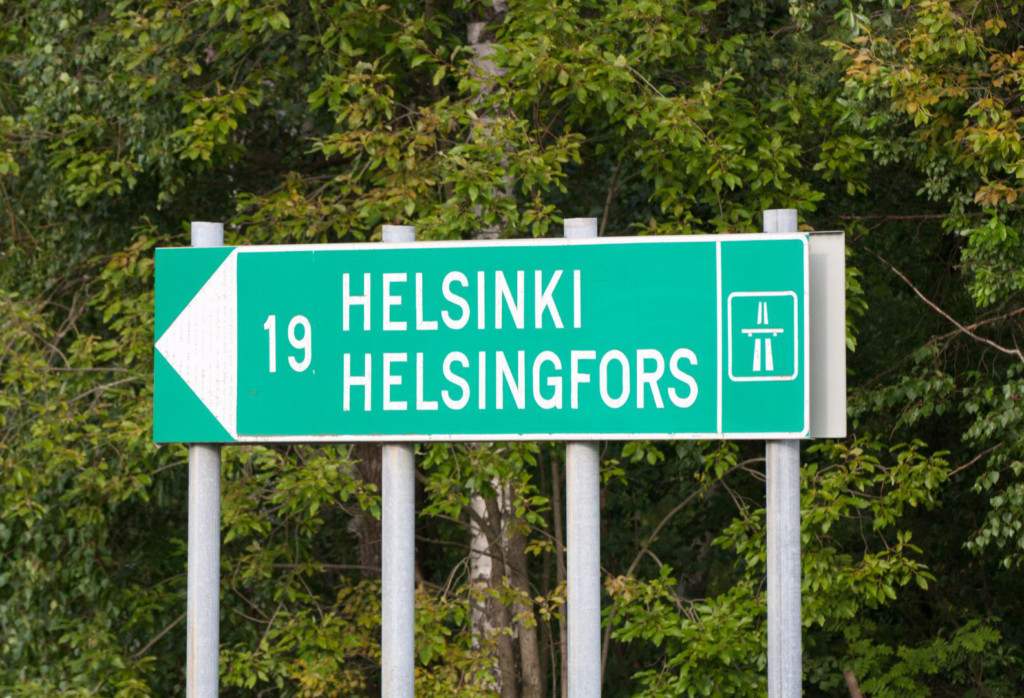
The rules are pretty simple:
If the municipality you are in has only one official language, the signs use that language (Finnish or Swedish).
If it has two official languages (Finnish and Swedish), the sign has both names.
Unfortunately, there might be no way around learning some names in both languages!
20. Silence and being quiet in public
If you are used to loud and chaotic public spaces, a Finnish commuter train can feel like a library. Of course, there is noise, but there is usually a shared understanding that being quiet is the polite way to behave.
Long-distance trains usually have a space to speak on the phone without disturbing others and separate cars for traveling with pets and children. Families can travel in any car, but you will find toys and maybe even a slide in the children’s car.
When I asked on Instagram on this topic, one reader mentioned: “I love stepping off of a plane to the peacefulness of the Helsinki airport where birds sing in the WC.” If you have visited Helsinki-Vantaa, you know what she means!
Another one added: “It’s so quiet in the public transport that you could hear a pin drop.”
21. Rules in apartment buildings
Being quiet can extend to Finnish homes. If you live in an apartment building, there are likely rules about when you can have a washing machine on and make noise, like play instruments, play music, and even vacuum. General sounds of living are fine.
Each building makes its own rules, which everyone in the building needs to follow. If you have a gathering or party coming up or are moving or renovating, it is polite to leave a note to your neighbors about when there will be additional noise. Even then, loud parties at night will probably lead to a visit from an angry neighbor or the police.
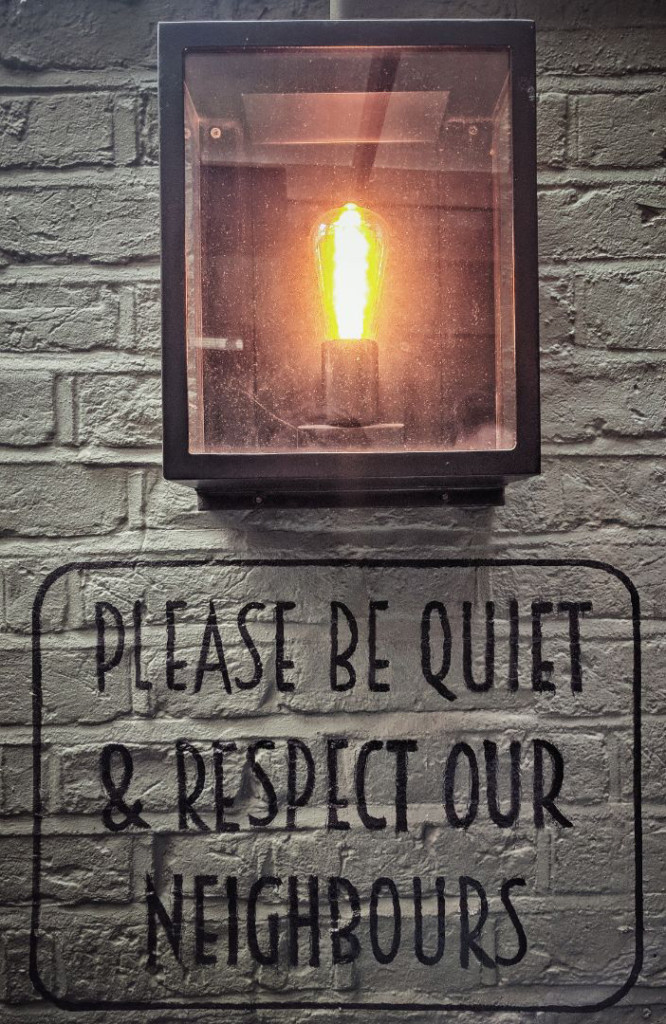
22. Living in a Finnish apartment
There is no doubt about it – you will find something different in a Finnish apartment. But what it is could depend on where you are from. Here are a couple of fun facts:
- Water in Finnish toilets doesn’t usually swirl but goes straight down
- Finnish bathrooms often have a bidet hose
- There are drying cabinets above the sink
- Many apartments (or buildings) have a sauna
- Most taps have mixers (not two separate taps)
- Washing machines are in the bathroom
- Many apartments don’t have dryers
- District heating through radiators is common
- Wooden floors are more common than carpet
- Balconies often have glass windows for winter
- Mail is delivered through a slot in your front door
This Instagram comment raised another interesting aspect of living in Finland:
“Keys to your apartment open all the other doors in the building that you need! And then the post office has a key that works on all doors! It’s like magic.”
Another one mentioned “how much Finns love recycling!”. Each building will have its own bins for different recycling materials like metal, and carboard.
23. People maximize personal space
Personal space is important for Finns, and people are used to more of it. Often a bus will be crowded, but there is an empty seat because some passengers would rather have more space and stand than squeeze through or sit at an awkward spot.
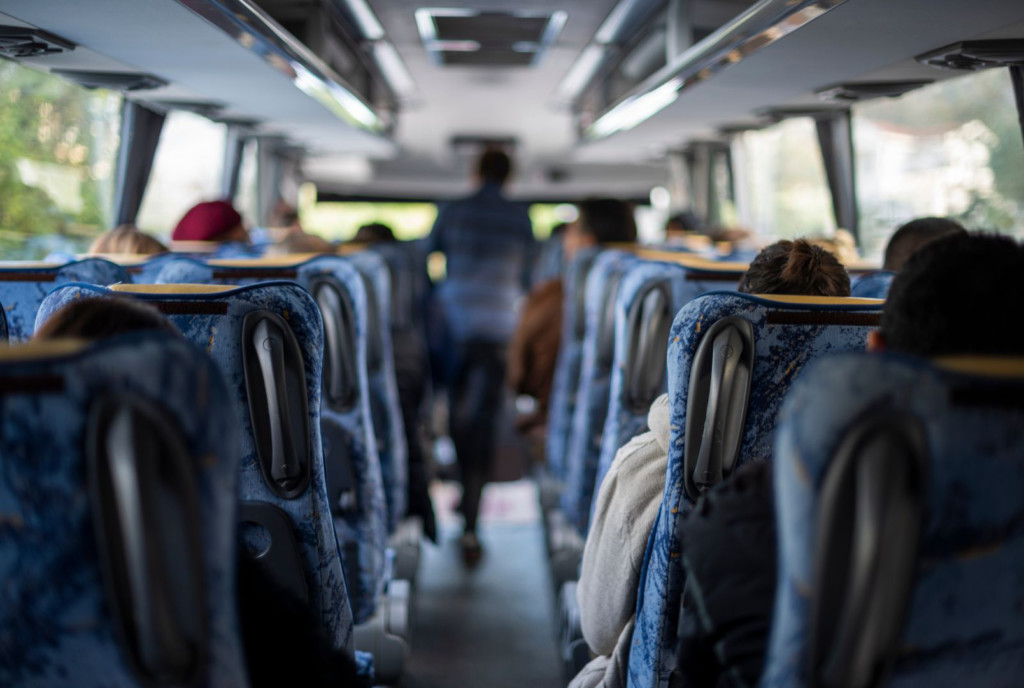
Fill in empty rows before sitting next to someone, and leave as much space as possible between standing people if you want to be considerate.
24. Everyone knows English but…
Finns speak good English, and there are even several cafes and restaurants that only serve customers in English. Many people still find that to make friends more easily, find a job, and fit in as a permanent resident, it really helps to know Finnish.
Having a basic knowledge of the language opens doors in Finland. You can live here and get everything done in English, but if you stay longer, it makes sense to learn Finnish. It shows locals and employers you are serious about fitting in and living here.
Ready to speak finnish?

Join my praised free class and speak Finnish words in 20 minutes!
25. Things won’t stop for snow or low temperatures
Chances are you are from a country where things stop when it snows, or it never snows a lot. Finland is cold for a large part of the year, and usually, things keep going. Schools don’t close, and public transport usually keeps going through snowstorms and freezing temperatures.
Many Finns even let their babies sleep outside (with appropriate warm clothes) when it is freezing cold.
26. Driving in Finland is different in the winter
When cars from warmer temperatures start having problems, Finns plug them in overnight so the vehicle has an easier time starting in the morning. Since winter tires are compulsory during winter, most people drive their cars unless the weather turns terrible. Finns also train for driving in the winter in driving school and even practice for encountering a moose while driving.
27. A crucial part of Finnish summers: summer cottages
Nearly 800 000 Finns are part of a family with a summer cottage or cabin. Many others rent them. Summer cottages, especially ones by a lake, are a very Finnish summer phenomenon. Many countryside towns grow significantly as the holidays start and people arrive to spend time at their summer cottages.

What do people do there? They do gardening, outdoor activities, swimming, go to sauna, and barbecue. Midsummer is a popular time to go to a summer cottage with friends or family. The cities in Finland can feel empty during the midsummer weekend at the end of June.
28. You will understand announcements and signs
Most Finnish announcements at stations and on trains are in Finnish, Swedish, and English. The same goes for signs with instructions and other information in cities. All buses don’t have announcements at each stop, but it is increasingly common.
29. Networks are important
Finns are described as so quiet and introverted that it might surprise you how important networks are in Finland. It really helps to know people through hobbies, work, and activities. Especially if you are looking for work, I recommend building your network and getting to know more people. Many jobs are never advertised publicly but they might exist if people know you are looking.
30. You can live without a car
Many Finns think of Finland as a country where you need a car because of the long distances. But in Helsinki, there are on average 0,34 cars per person. That means a family of three might own one car, rather than both parents driving to work or that only 1 in 3 single households owns a car.
Finland has excellent public transport networks within bigger cities and good train connections between cities. Especially compared to places where public transport is dangerous to use or it does not cover the whole city, many big cities in Finland are very easy to navigate without a car.
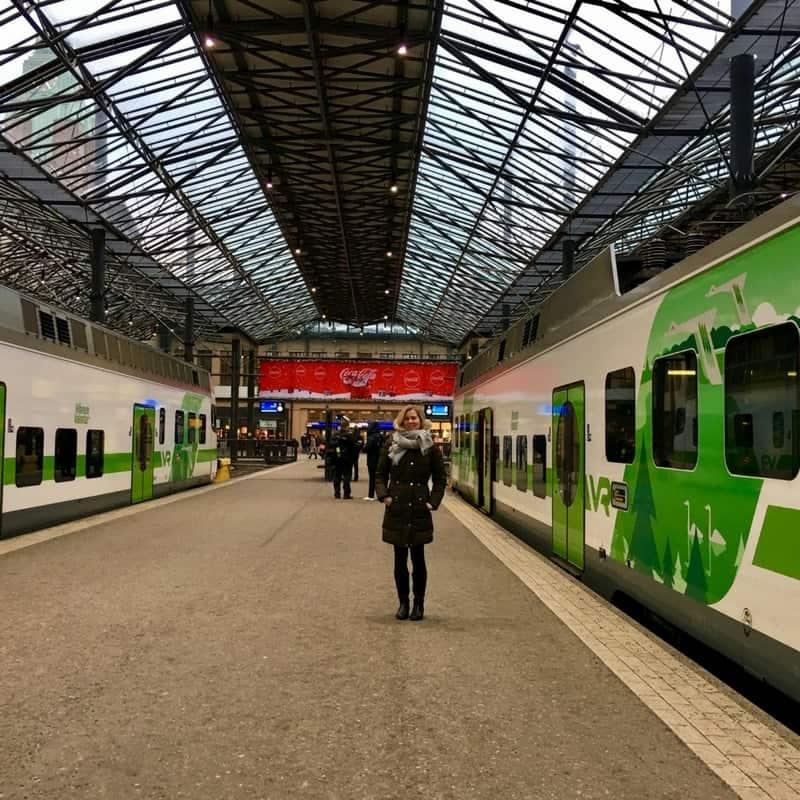
31. How efficient and organized everything is
From people not crossing at red lights to everything running on time, things in Finland are organized and efficient. You might either discover things go as smoothly as you expect them to or see a huge positive change compared to where you are from.
One Instagram comment mentioned how this manifests in practice:
“Finland is such a clean country, especially when you compare it to the majority of the US. Finnish people respect their country and other people.”
And another one simply said: “Wow, reading the comments makes me really want to move to Finland…”
If you now feel the same, continue reading…
Is there anything you would like to know about living in Finland, or would you like to add something to the list? I would love to hear your thoughts in the comments.
Here are some other articles that you might find interesting as you keep learning about living in Finland:
Moving to Finland: Living in the 20 Largest Cities
Is it expensive to live in Finland? 5 examples of cost of living in Finland (family, single person…)
Finnish Culture: Discovering Everything You Need to Know
50 Cool Things Finland is Known for
References:
Credit records when moving from abroad (in Finnish)
Number of cars in Helsinki
FinNISH CONNECTION COLLECTION 🇫🇮
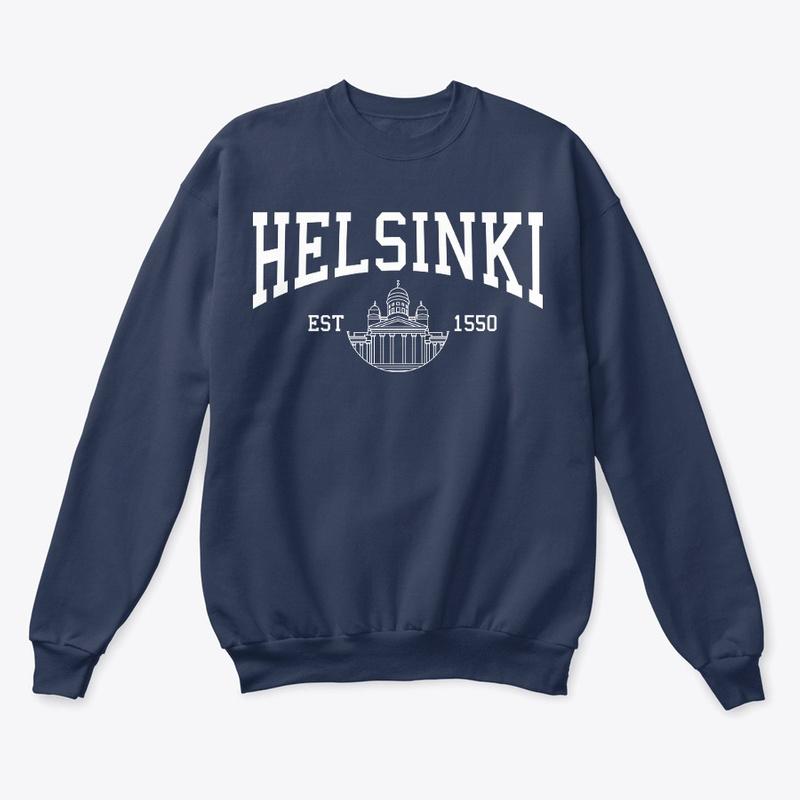
Finland-themed sweaters and accessories made-to-order. 🧡 Worldwide shipping.

